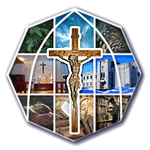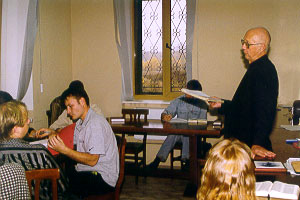 |
|
Duration of the program and its constituent parts. The duration of studies at Novosibirsk seminary is 4 years, although it may be as long as 4 1/2 years for some students. The program consists of three basic parts: (1) 3 years of academic studies, (2) 1 year of practicum, (3) doing research for and writing of a graduation diploma. Number of courses required and course hours. During 3 years of studies, a student takes 35 mandatory courses and 5-8 elective courses. The normal time for one course is 30 hours. (If the course is offered by a foreign instructor, then with translation there are 45 hours pure class time.) The New Testament Greek course is 60 (90) hours, and Old Testament Isagogics I, Hermeneutics, and each of the four dogmatics courses consist of 40 (60) hours. Old Testament Hebrew Readings and New Testament Greek Readings are offered throughout the seminary program, and the duration of each of these courses is at least 75 (112) hours.
Theological English is offered twice a week for 3 years, totaling about 300 hours. Thus mandatory seminary courses occupy about 1500 (2100) hours. With elective courses added, the total is about 1680 (2370) hours. First-year courses and research papers. During the first year, students study such foundational courses as Hebrew, Greek, Old Testament and New Testament Isagogics, Lutheran Confessions, and History of the Reformation and the Present, upon which the entire subsequent program is built. The offering of other courses in the first year may vary. Beside the courses, in the first year a student is expected to write a 25-page paper, which consists of a review of a book chosen upon the advice of the faculty. Upon completion by students of the first year of training, the leadership of the seminary makes a decision about their admission to second-year studies. In the second year of training, students write a course work of 30-35 pages; and in the third year, a thesis, 40 pages long, reflecting research in at least two areas of theology. (The fourth year is the practicum year; usually this takes place in the home congregations of students.) Graduation diploma research. Upon the successful completion of vicarage, a student is allowed to register for a diploma project. A student may spend anywhere between 3 and 6 months for diploma research and writing, which accounts for the maximum seminary stay of 4 1/2 years. Modern foreign language requirements. The seminary does not require for admission a knowledge of a foreign language, but it does all that is possible to equip students with this tool. At present, sufficient quantities of Lutheran theological materials are not available in Russian, so fluency in a foreign language renders invaluable service to seminary studies. Knowledge of a foreign language has to be demonstrated toward the end of a studentís studies. In his third-year thesis as well as in the process of diploma research, a student is required to use at least one foreign language: English or German. English is offered at the seminary as a mandatory course for all 3 years of study, while German may be taken as elective by anyone who wants to pursue studies in this language. Seminary accreditation. The official accreditation of the seminary is a matter of the future, but even now the seminary program corresponds to the level of the highest theological education. The present stay with us of Professor Alan Ludwig, as well as a future supply of qualified Russian instructors, create good prospects in this area. The process of accreditation will take several years and will include three stages: (1) independent registration of the seminary, (2) getting a state license for education, and (3) accreditation itself. Along with attempts to move toward accreditation with the Russian government, the seminary will try to get official recognition from Western accrediting agencies, so that selected Novosibirsk seminarians may continue their studies at a post-graduate level. Already certain theological schools in North America are ready to acknowledge our education as an equivalent of MDiv degree. Future development of the academic program. The greatest shift anticipated in the realm of academic studies at Lutheran Theological Seminary is the addition of a pre-seminary program of education in the city of Novosibirsk. This program will be two years long. It will include general liberal arts subjects: Russian, history, philosophy, and the like. Most likely, English, as well as one of the biblical languages, e.g., Greek, along with a general course on the Bible, will be offered as well. Those with a university or college education, especially in history, philosophy, or philology, will not for the most part be required to go through this program, with the exception of such courses as New Testament Greek. The pre-seminary program in Novosibirsk will aid better preparation of seminary candidates. At the same time, these people will have the opportunity of getting some experience in practical work in the church, where as laymen they will do things not pertaining to the pastoral ministry by assisting pastors and deacons in the liturgy and in Christian works of love. There is already a biblical school in Khakassia, which also serves as preparatory school for the Novosibirsk seminary. One possible development in the future may be that the biblical school in Khakassia will serve the students from Eastern Siberia, while the pre-seminary program in Novosibirsk will serve the students from Western Siberia. In addition, a pre-seminary school in Ekaterinburg, which is likely to be organized through the WSCM missionary congregation there, will serve students from the Urals and the European part of Russia. The regular seminary program is likely to stay as it is for a number of years. The seminary will increase its faculty and produce its own textbooks. The seminary library will expand, with the goal of joining the system of Novosibirsk educational and science libraries. More cooperation with Novosibirsk State University and other educational institutions is expected, allowing the seminary to spread its influence in the city and make some impact on the students of the other schools. |

